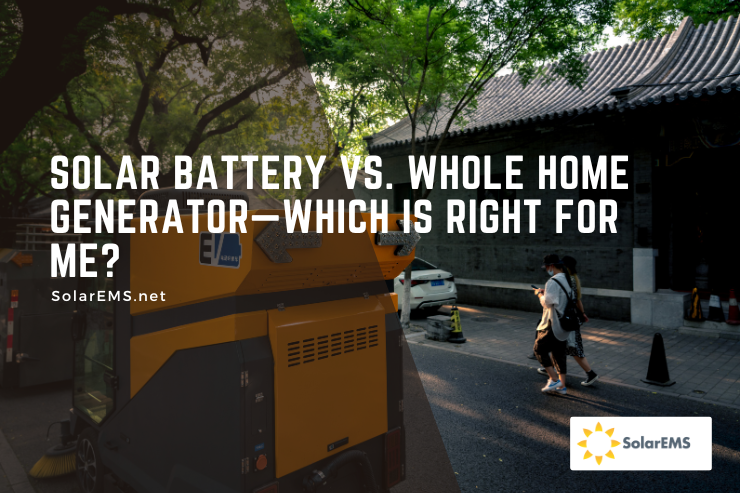Solar battery backup vs generator is often an ongoing debate since the inception of solar panels. Both of them have their pros and cons as solar batteries work by storing the sunlight which is renewable whereas generators can work in any conditions and uses fossil fuels. In this article, I’ll provide the details on solar panels vs generators which help with easy decision-making.
Explanation Of Solar Battery And Whole Home Generator
Solar battery backup for home is a type of battery system wherein we can store the extra sunlight we get from solar panels for later use. This stored light can be used at night, during power cuts, or when there is no sunlight. A whole home generator is a device that runs on liquid propane, natural gas, or diesel and creates electrical energy from it which helps during times of power outages.
Importance Of Backup Power During Emergencies
The decision between solar panels vs generators is important, but having any type of backup is very essential because it helps us keep working at the time of blackouts which eventually saves our precious time. Also, the home appliances such as ACs, washing machines, fans, etc. will keep on working without any disturbance.
Factors To Consider When Choosing Between Solar Battery And Generator
There are many factors to consider when choosing between solar power and generator backup such as pricing, maintenance, weather conditions, need, etc. However, we will go through this part later in this article and know more about how to choose between them.
Solar Battery vs. Whole Home Generator: Pros And Cons
Whenever we think of any type of battery backup such as solar panel and generator backup options, we should know the pros and cons of each type.
Solar Battery
Pros
- Runs on renewable energy: This is the most important benefit of using solar batteries as they simply work on sunlight which is a renewable form of energy. This will reduce the level of pollution and save our environment from harmful gasses.
- Lower maintenance cost: Solar batteries have much lower maintenance cost and they can be cleaned easily using a soft cloth. In the US, we can also get tax credits once we install solar panels in our homes.
- Quiet operation: The solar batteries are quite operational as they can be used at night or when there is no sunlight. They also come in portable mode and we can move them anywhere in the house.
Cons
- Expensive upfront cost: The initial cost of installing solar panels and batteries can be high if we compare the home generator vs. solar power cost.
- Limited power output: Solar batteries have limited power output because they can only be used for lighting up small devices such as chargers, lights, fans, etc. Also, heavy solar batteries are quite expensive to purchase.
- Dependent on weather conditions: Solar batteries solely depend on how much light they get from the sun. Therefore, if we are living in a cloudy area, then the solar battery will not work.
Home Generator
Pros
- Higher power output: When comparing the solar panels vs. diesel generator’s power output, then the generator surely gets ahead of the race because it can provide energy to heavy equipment such as ACs, automobile chargers, refrigerators, etc.
- Works regardless of weather conditions: The home generators work on fossil fuels such as natural gas or diesel which means that they can run whichever the weather condition will be in our area.
- Can be powered by various fuels: Home generators can be powered by various types of fuels such as natural gas, propane, diesel, petrol, etc. They do not depend on a single source of energy.
Cons
- Higher maintenance cost: The maintenance cost of home generators is quite high with regular cleaning of the engine and adding fuel to it from time to time.
- Noisy operation: The motor of the generator continuously works to convert the mechanical energy into electrical energy which makes a loud noise and this can be very disturbing for the people living in that area.
- Limited lifespan: The generators have a shorter lifespan because of the continuous working of the internal machines and tools in it to make electricity.
Factors to Consider When Choosing Between Solar Battery And Whole Home Generator
After knowing the pros and cons of solar batteries vs. generators, we should know the factor that will help us decide which is best for our homes.
- Energy needs of the home
The decision between the solar battery and the whole home generator is dependent on our energy needs at home. If we want to run heavy appliances, then the generator is best because they work on fuels that can work continuously without any interruption. If we want to run the small appliances for some hours in a day, then solar batteries can be installed.
- Budget
The cost of installing a solar battery is somewhere around $10,000 while the cost of a home generator is around $5,000. Therefore, budget is the most important factor when deciding between the two. While the cost of a generator is lower, it does not provide any tax credits and is difficult to maintain as compared to a solar battery.
- Availability of fuel and resources
If there is easy availability of fuels at lower prices, then the generator can be chosen. But if there is an unavailability of fuels and they are available at high prices, then we should go with solar batteries.
- Environmental impact
Home generators create heavy damage to the environment because they work on fuels that pollute the surroundings. Also, with the limited availability of natural fuels, it is difficult to replenish them. Solar batteries are free from this distinction as they are completely environment-friendly and use an inexhaustible source of energy.
- Maintenance requirements
When comparing the solar battery vs. portable generator maintenance requirements, then the solar battery is surely a winner. The solar battery does not require any regular maintenance because it works on solar energy and there is no need for regular cleaning. The generator requires heavy maintenance with the cleaning of the motor and equipment fitted into it because the fuels get stuck to it.
- Location and weather conditions
Solar generators are best when we live in a location that has more sunny days rather than cloudy or rainy days because they can only charge when the panel receives the full eight hours of daylight. On the other hand, the generators are not dependent on weather conditions.
Conclusion
However, which is better for backup power: solar battery or generator, is dependent on one’s budget, needs, preferences, etc. But, I recommend solar batteries to all homeowners because this is a type of backup solution that is the future of the world and the best alternative in times of continuous falling of non-renewable sources of energy.
FAQ Related To Solar Battery vs. Home Generator
How long do solar batteries last?
Solar batteries generally last for more than 15 years and once fully charged, they can provide energy to homes for one or two days. However, longevity also depends on how much time we use it in a day.
What size solar battery do I need?
On average, we need a 10Kwh solar battery for our homes that can work non-stop for at least eight hours a day. It is more than sufficient to light up our homes in emergencies or at night.
How much does a solar battery cost?
The average cost of purchasing a solar battery can be around $10,000. However, the cost may vary for different types of solar batteries such as lithium-ion, lead-acid, etc.
How long can a whole home generator run?
A whole-house generator can run for around 15 hours continuously if the tank is full of gas or petrol. However, the duration may depend on the capacity and tank size of the generator.
What size generator do I need for my house?
The appropriate generator size for a house ranges from 7500W to 10,000W. It can run heavy appliances such as refrigerators, water heaters, air conditioners, washing machines, water motors, etc.
How much does a whole home generator cost?
A whole home generator typically costs an average of $10,000. The maximum cost can reach $25,000 while the minimum cost can fall to $4,000 which varies on which type of generator size is chosen.
How often should a whole home generator be maintained?
The whole home generator should be maintained or checked after every six months to make them work at full speed and increase its lifespan.
Can a solar battery and a whole home generator be used together?
No, both the solar battery and the whole home generator cannot be used together because one will automatically turn off when the other is in power.
What happens when the power grid goes down?
When the power grid goes down, all the electricity in the place gets cut and no electrical appliance can work for a long period.
This article is better than any other article on the internet because it tries to cover all the points such as pros, cons, and factors which helps the readers with easy decisions. Also, it tries to answer all the queries a reader might have in short FAQs.


